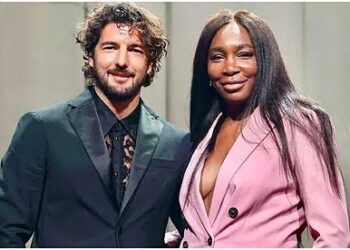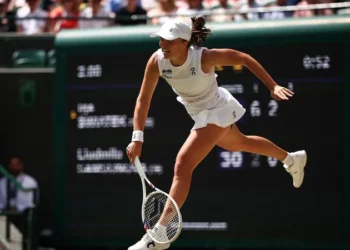In the often buttoned-up world of professional tennis, honesty off the court can be just as revealing as performance on it. Rising American tennis star Coco Gauff made headlines recently when she candidly admitted that some of her Wimbledon rivals “cheat”—a striking claim that quickly reverberated throughout the tennis community. The 20-year-old sensation, known as much for her maturity and integrity as her explosive game, believed she was having a private conversation when the admission occurred, but later feared that her comments had been overheard or picked up unintentionally.
The moment unfolded in a behind-the-scenes exchange that wasn’t intended for public consumption. Gauff, likely venting her frustrations or sharing her unfiltered thoughts with her inner circle, allegedly pointed out instances of opponents pushing the boundaries of fair play. Whether referring to questionable medical timeouts, gamesmanship during service returns, or other subtle infractions common in the high-stakes world of Grand Slam tennis, her comments struck a nerve.
Though Gauff did not name specific players, the broader implication was clear—she feels that not every competitor on the hallowed grass courts of Wimbledon always plays by the book.
A Tense Wimbledon Atmosphere
Gauff’s comments come amid an already tense Wimbledon tournament. Pressure is always immense at the All England Club, where the lush green courts represent tradition, prestige, and opportunity. For players like Gauff, who carry the weight of expectations from a global fanbase and national pride, the intensity is magnified.
Gauff has long been seen as one of the sport’s golden hopes, having burst onto the scene at Wimbledon as a 15-year-old when she stunned Venus Williams. Since then, she has matured into a Grand Slam champion—most notably winning the 2023 US Open—and a vocal advocate for fairness and transparency in tennis. So for someone of her stature to suggest that cheating is a problem on the Tour is no minor accusation.
Even if said in a moment of privacy, the fact that Gauff feared her words might have been overheard adds a layer of tension to the situation. It raises questions about the dynamics between players in the locker room and the code of silence that often surrounds controversial practices in tennis.
Cheating in Tennis: An Ongoing Concern
While tennis is generally considered a sport governed by honor—players are often responsible for making their own calls at the amateur level—cheating in the professional arena has long been a topic of discussion. From questionable line calls before the advent of Hawk-Eye technology to strategic medical timeouts aimed at disrupting an opponent’s momentum, elite players have occasionally bent the rules.
What constitutes “cheating” can also be subjective. For instance, some might interpret taking extended bathroom breaks during tight matches or deliberately slowing down play as tactical rather than unethical. However, Gauff’s use of the term suggests a deeper level of concern and perhaps repeated experiences that left her feeling disillusioned.
Her reaction to the possibility of being overheard also shows a deeper anxiety—how much truth can a player share without facing consequences or backlash? In a sport where reputation, sponsorships, and relationships matter, even speaking the truth can be risky.
Support and Backlash
Reactions to Gauff’s comments have been mixed. Many fans and pundits praised her candor and expressed sympathy, noting that she’s likely not the only player frustrated by the lack of enforcement of certain rules. Her honesty has reinforced her image as a player with integrity who wants to see the game played fairly.
Others, however, criticized the remarks as potentially inflammatory, especially given that no names were mentioned. Without concrete examples, some argue, such accusations can unfairly cast doubt over an entire field of competitors.
Still, insiders have speculated that Gauff’s frustration may stem from personal experiences in recent matches, especially against seasoned veterans who may use every legal—and occasionally illegal—advantage to secure victory.
What Comes Next
It remains to be seen whether Gauff will clarify her remarks or let them fade into the background noise of an already dramatic Wimbledon tournament. If the issue gains traction, the WTA or tournament organizers may be compelled to address the general question of gamesmanship and fairness more publicly.
For now, Gauff continues her Wimbledon campaign with laser focus. On the court, she remains a formidable force, combining athleticism, power, and poise. Off the court, her willingness to speak—even when she thinks no one is listening—reveals a competitor unafraid to call out issues that many prefer to ignore.
Whether whispered in private or said aloud, Gauff’s comments have added a new layer of drama to the Wimbledon narrative. In a sport where etiquette and tradition reign supreme, the simple suggestion that “some cheat” may be enough
to start a much-needed conversation.











